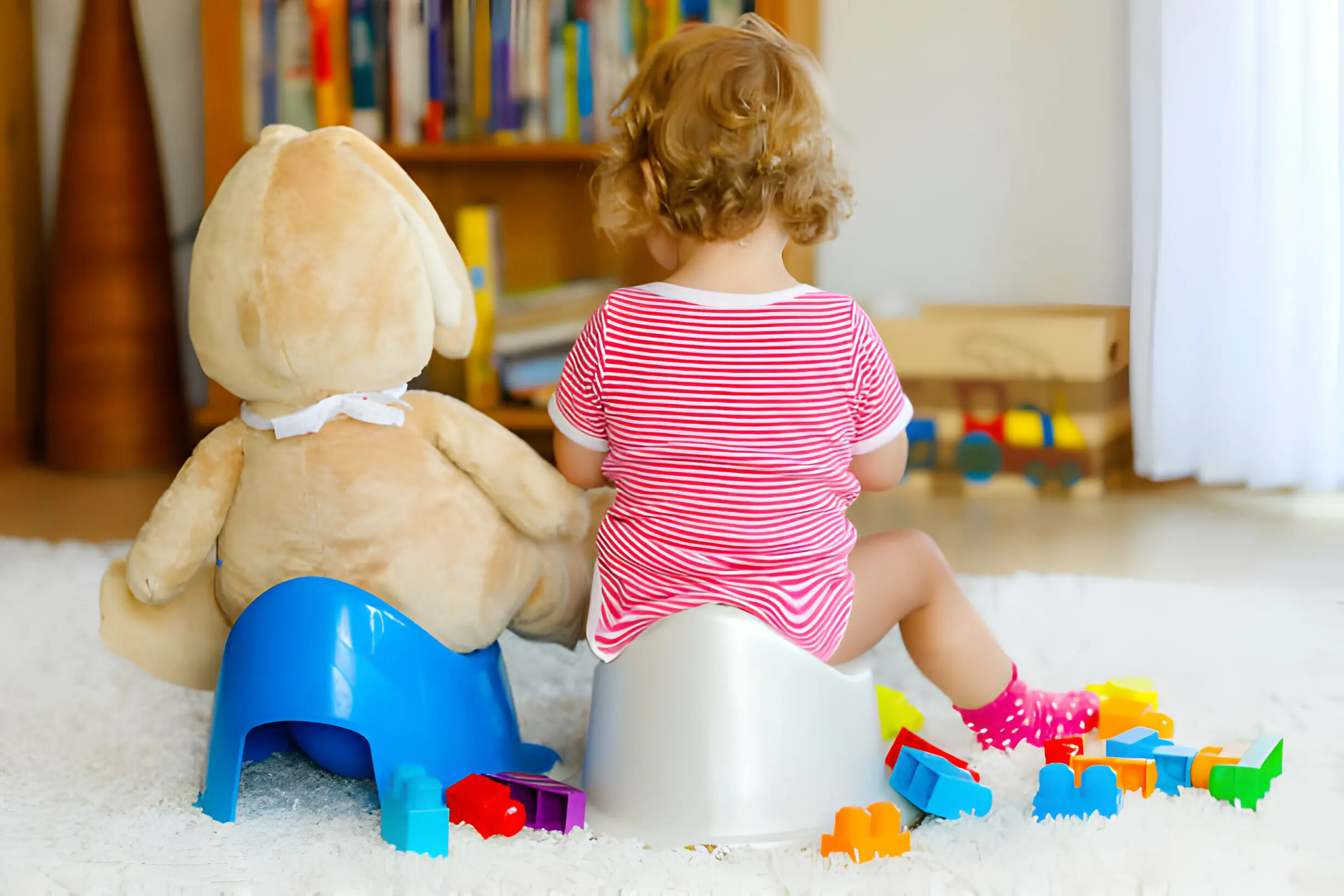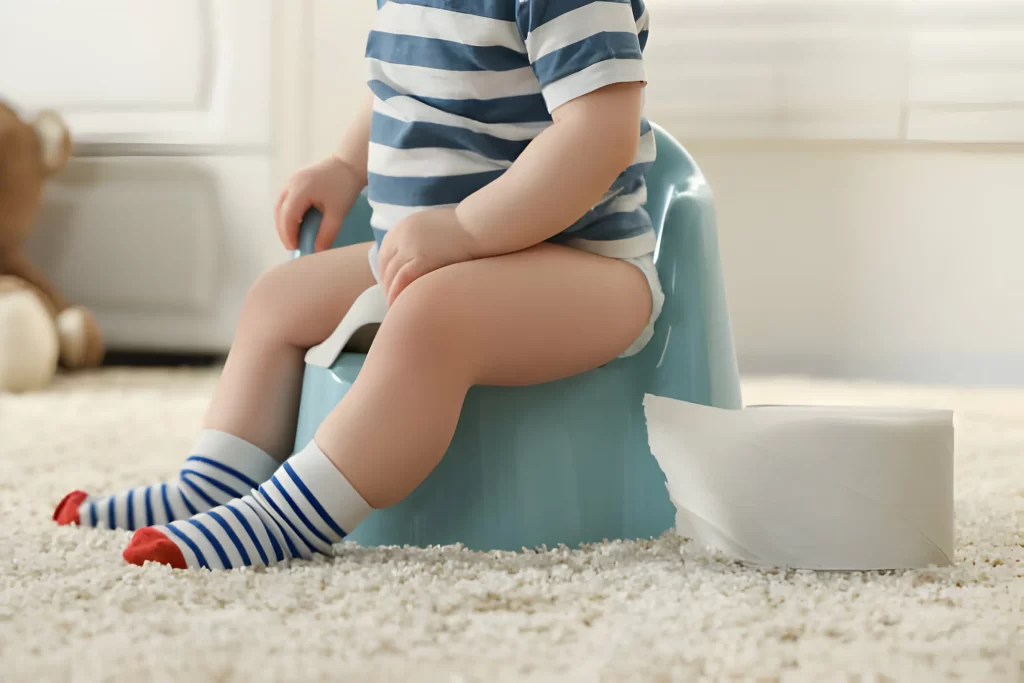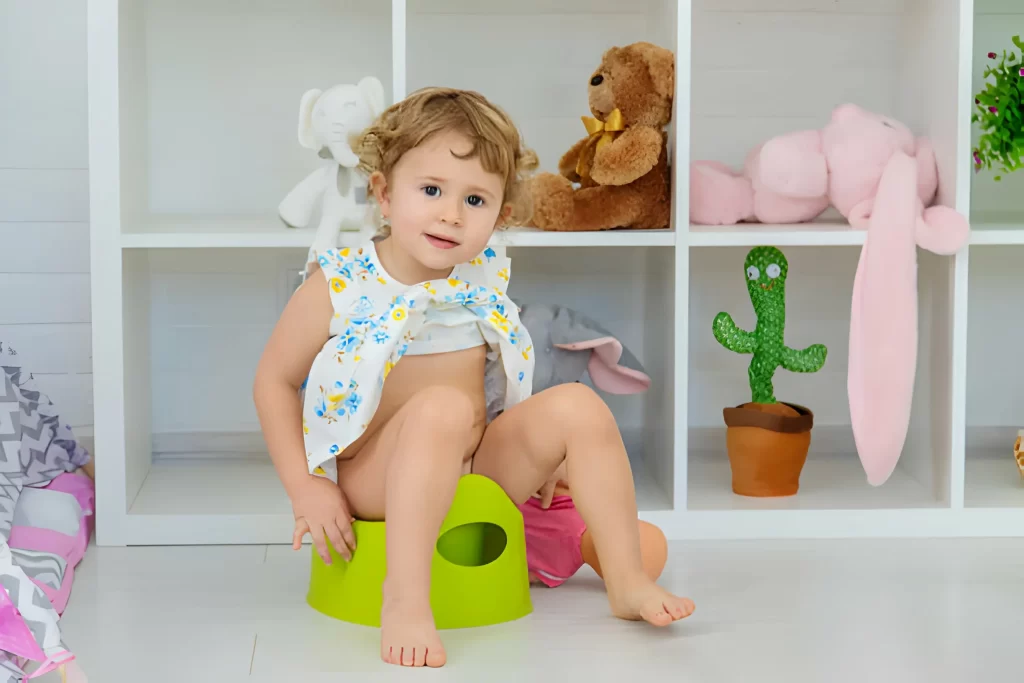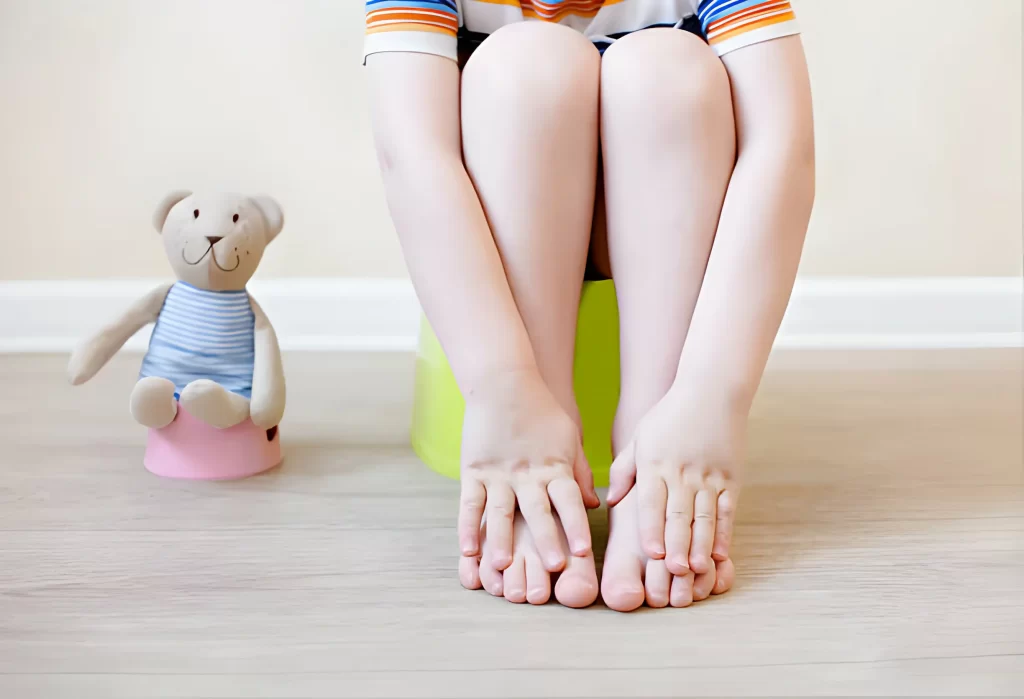Average Age of Potty Training

Many children succeed in potty training at approximately three years of age. The American Academy of Family Physicians notes that between 40 and 60 percent of kids are fully potty trained by the time they reach 36 months. Nevertheless, it’s common for some children to continue the training process until they are three and a half years old.
Below are several key behaviors to observe at each stage that could indicate readiness for potty training.
Potty Training Age 2

Some parents start potty training their toddlers when they are around 2 years old, which can potentially get the messy diaper stage out of the way before the “terrible twos” really kick in. Many experts consider starting between 22 and 24 months appropriate. At this age, kids are starting to show an interest in the potty and have enough motor skills to walk, dress, and undress themselves with some help.
However, every child develops at their own pace. Just because two-year-olds seem physically capable of using the toilet doesn’t necessarily mean they are emotionally ready. Frustration, resistance, and power struggles can make the process much harder than it needs to be if a child simply isn’t interested or able to understand what’s expected of them.
Potty Training Age 3

The most common time for children to begin potty training is around their third birthday. At age 3, most children have the physical and cognitive skills needed to learn this important self-care skill, including bladder and bowel control, motor skills, the ability to follow simple instructions, and the communication skills to let parents know when to go.
With girls tending to be physically ready a little earlier than boys on average, many parents choose to kick off the potty training process sometime between 27-32 months. When trained at this age, kids also tend to have an easier time fully mastering daytime potty skills within a few months.
Potty Training Age 4

While most children are potty trained by age 3, in some cases, kids simply aren’t ready until closer to age 4. As long as your pediatrician doesn’t see any potential medical issues at play, there’s no need to worry if your child is a “late bloomer.” Some kids this age actually have an easier time with potty training because they have more cognitive ability and self-control.
Starting around 36 months or a little later can spare parents and children months of frustration and battles of wills. Often, when children take the lead in wanting to get out of diapers, the process goes much more smoothly.
Signs of Readiness for Potty Training
Rather than going by age alone, it’s best to watch for cues that your little one has reached key milestones and is prepared for the potty training process.
Here are some of the top signs that your toddler may be ready:
Staying Dry: If your child can stay dry for a couple of hours, it may indicate that they have developed bladder control, a prerequisite for potty training.
Interest in the Potty: If your child shows interest in it, asks questions about it, or wants to wear underwear instead of diapers, it could be a sign that they are ready to start training.
Ability to Follow Instructions: Children who can follow simple instructions, such as “sit down” or “pull up your pants,” may be better prepared for potty training.
Discomfort with Dirty Diapers: If your child starts expressing discomfort when their diaper is wet or soiled, it may indicate that they are becoming more aware of their bodily functions and may be ready to start using the potty.
Predictable Bowel Movements: If your child has a predictable pattern for bowel movements, it can be easier to anticipate when they need to use the potty and schedule potty breaks accordingly.
Communication Skills: Children who can communicate their needs, either verbally or through gestures, may have an easier time letting you know when they need to use the potty.
Emotional Readiness: Potty training can be challenging, so it’s important to ensure that your child is emotionally ready and willing to participate. Look for signs of independence, frustration tolerance, and a desire to please.
Things You Can Do to Prepare Your Toddler for Potty Training
If your little one isn’t quite showing the readiness signs yet, there are some things you can do to help prepare them for this major transition:
- Teach them the words for bodily functions like “pee” and “poop”
- Let them see you or older siblings use the potty to normalize it
- Have them try briefly sitting on the potty with clothes on to get familiar
- Make handwashing a regular routine after diaper changes
- Work on pulling pants up and down
- Stick with easy clothing that’s simple to remove for potty trips
- Read books together about using the potty
- With gentle reinforcement and a casual introduction to these potty training concepts, you can set your toddler up for success once they’re truly ready.
How to Start Potty Training
The First Steps of Potty Training
Once your child seems to have the key readiness signs in place, you can begin introducing the actual potty training process. The first steps often include:
- Letting them pick out special “big kid” underwear
- Taking a trip to pick their potty seat or potty chair
- Scheduling potty breaks every 1-2 hours
- Encouraging them to try and make a habit of it
- Using sticker charts and small rewards for successes
- Being patient and avoiding punishments for accidents
- Consistency and positive reinforcement are key in these beginning stages. Many kids have more “misses” than “hits” at first, but by establishing a routine, you’ll get them on the path toward being reliably potty trained.
When to Delay Potty Training
While there’s a general age window when many kids get potty trained, there are instances when hitting “pause” is advisable:
- During any major life transitions (new sibling, move, etc.)
- If your child seems bored or uninterested
- When traveling or routines are interrupted
- After negative experiences like harsh scolding or punishments
- If your child shows signs of significant resistance or fear
- Listen to your parental instincts. If your child just doesn’t seem ready despite their age or your best efforts, you may need to take a break and try again in a couple of months. With some kids, pushing too hard can backfire and make the process more difficult.
Potty Training Tips
Once you do take the potty training plunge, keep these tips in mind to increase your chances of success:
- Stick to a routine, like trying first thing in the morning
- Have your child try to “beat the clock” by going every hour
- Make sure they can easily get clothes off in time
- Use small rewards and tons of praise for achievements
- Stay positive; accidents are part of the process
- Get everyone involved, like teachers/daycare
- Never punish or shame for potty training setbacks
- Try different techniques and see what clicks best
- Be consistent for days/weeks until habits are set
- When Potty Training Should Be Put On Hold
In some cases, starting or continuing potty training can backfire and create a negative experience if:
- Your child is going through major disruptions or stressful events
- There are big transitions occurring, like a new house or a sibling
- Your child becomes bored, frustrated, or hyper-resistant
- You find yourself punishing them for accidents
- Your child has developed a fear or phobia around the potty
- Listen to your gut. If your toddler just isn’t getting it despite your efforts, or the process is causing significant distress, it may be better to take a break and try again in a few months when they’re in a better headspace. With time, patience, and the right approach for your child’s temperament, they will get there. The potty training journey is rarely linear, but staying positive goes a long way.
Remember, every child is different, and there is no specific age at which all children are ready for potty training. It’s important to watch for these signs and not to rush the process. Patience and positive reinforcement are key to successful potty training.
Below are some answers to questions you might be asking yourself:
How do you potty train a toddler fast?
While every child is different, there are some tips that can help potty train more quickly:
- Use positive reinforcement and rewards for successes
- Be consistent with a routine and schedule potty breaks frequently
- Let your child pick out their own potty chair or seat to get them excited
- Once they’re ready, go diaper-free with easy-to-remove clothing
- Be patient and avoid punishing accidents, which can create setbacks
- Do smarter kids potty train earlier?
- Intelligence alone does not necessarily dictate potty training readiness. While bright kids may pick up the concepts faster, physical and emotional factors play a bigger role. A child’s communication skills and desire to please can influence the timeline more than IQ.
What are the side effects of potty training?
Some common side effects as kids get used to potty training include:
- Constipation from withholding bowel movements
- Bed-wetting at night while mastering daytime training
- Rashes or infections from improper wiping
- Temporary digression or regression in the process
- Stubborn resistance or power struggles
- Do diapers delay potty training?
- While diapers don’t directly delay training, using them long-term can reduce a child’s motivation to use the potty. Taking diapers away once a child is ready creates incentive. However, pulling diapers too soon before readiness can significantly disrupt and prolong the process.
What are the benefits of potty training early?
Some benefits of earlier potty training can include:
- Saving money on diaper costs sooner
- Allowing more independence and self-care skills
- Smoother transition to preschool or group care settings
- Positive self-esteem and sense of accomplishment
- Making way for other developmental milestones
How often should I ask my toddler to potty?
When actively potty training, experts recommend:
- Trying first thing after naps and every 1-2 hours
- Watching for cues like holding themselves or squatting
- Taking them routinely before/after meals and before bed
- Seeing if they can hold it when you ask to test readiness
Do girls potty train earlier than boys?
On average, girls do tend to show signs of potty training readiness slightly earlier than boys, often around 6 months sooner. However, this is just a broad average, and there is a wide range of normal for both genders based on the individual child.
